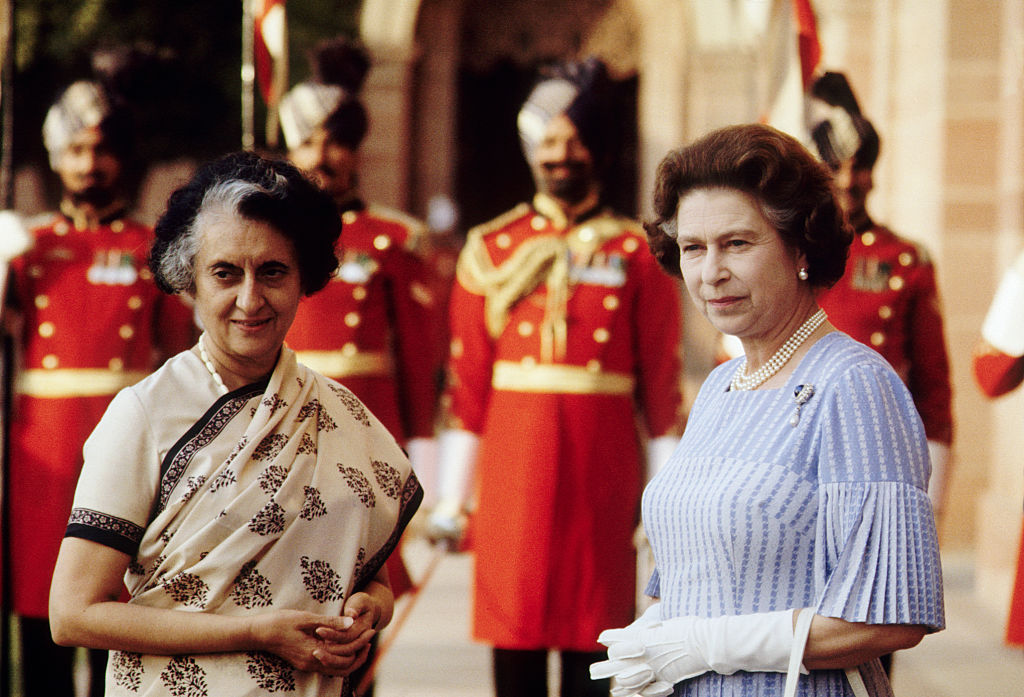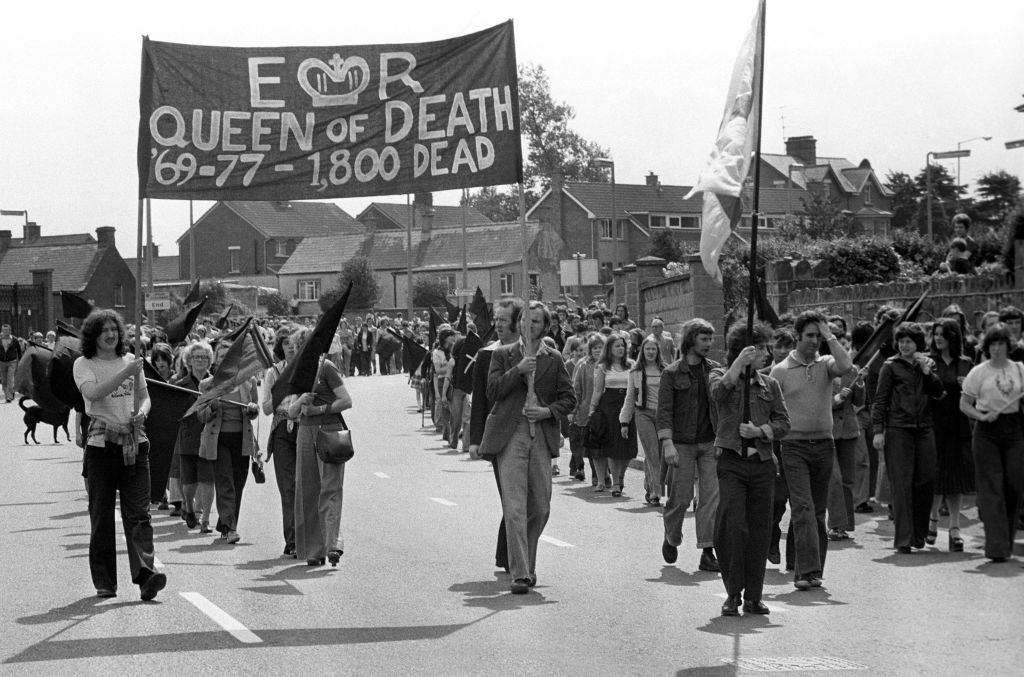“Why Are We Still Talking About Royalty?”
BY MEGAN CARPENTIER
When Queen Elizabeth II—the former Elizabeth Windsor—died last week, she received the uncomplicated veneration we bestow upon world leaders and celebrities (and the occasional person, like The Queen, who was both) upon their passings. But she was also criticized and mocked, online and off, by those whose ancestors and culture had been subject to the violent, extractive colonialism of the vast British empire.
Those criticisms, of course, were inevitably followed by calls to not speak ill of the dead, verbal attacks on those who did, and yet further paeans to her 70 years of rule.
A little background: When Elizabeth Windsor was born in 1926, only a handful of the colonies her family had ruled for generations—Ireland, South Africa, Canada, New Zealand, and Australia—had achieved nominal independence. And by 1952, when she came to power, only India, Pakistan, Sri Lanka, Burma, Palestine, and Egypt had joined them. But within the 15 years of her ascension to the British throne, the empire that had at its height encompassed 25 percent of the Earth’s landmass, controlling the lives of 20 percent of its people, now consisted of just a few islands. (The largest and most populous of these was Hong Kong, which reverted to Chinese control in 1997.)
But though the dissolution of the British empire under Queen Elizabeth II is thought of as peaceful in the popular Western imagination, in many places it was far from an orderly, non-violent handover of power. For instance, mere months after Elizabeth II took the throne, British forces began a nearly decade-long campaign to suppress an independence movement in Kenya, which they referred to as the “Mau Mau uprising.” Recent research has shown this campaign involved the mass detention of 1.5 million Kenyans, most of whom belonged to the Kikuyu ethnic group, and a systematic process of torture, forced labor, rape, and murder that the British government covered up for decades.
The British government still holds documents from 37 other former colonies in still-secret archives that are reportedly similar to the ones that proved their involvement in the “Mau Mau uprising” in Kenya.
Nonetheless, the Queen never apologized for the abuses of colonization, and there have been calls—long-standing and recent—for the British government to do so, and to provide reparations to countries damaged by extractivist colonialist policies and reconsider the role the British monarchy should have (if any) in the 21st century and beyond.
To talk through some of these questions, The Meteor turned to the people whose lives and ancestors were affected by British colonial policies about why there is both criticism and admiration of Queen Elizabeth II—and what her death represents.
“…if the British had found diamonds here, we probably wouldn’t be independent now.”
–Tshepo Mokoena, London-based journalist and editor, originally from Botswana
The running joke in my family in Botswana was always that, if the British had found diamonds here, we probably wouldn’t be independent now. But we gained independence from the British in 1966; the diamonds were discovered in 1967. [The mining company is jointly owned by the Botswana government.] The diamond money was used to fund public services and public health, which was very important as the HIV crisis hit Botswana in the 1990s.
There was a sense that we happened to time the discovery of the mines quite well, whereas in South Africa—where the mines were found early—there was that constant tug-of-war between the British and the Dutch. And it created centuries of a back-and-forth of European powers trying to control South Africa’s resources.
Today I would say that the monarchy feels very distant from Botswana, because it is a small, landlocked country where there is not a strong remnant of white settlers. Besides some leftover rituals around Christmas and Christianity, you don’t tend to feel much of that connection to Britain, and especially not to the royal family as an institution.
“But by and large, the reaction [among Indians] has been almost like losing any other beloved celebrity who was like this grandmotherly figure.”
–Rohit Kulkarni, D.C.-based former journalist, originally from India
Currently, whether in Bollywood, among the cricketers from India, or in [Indian] society in general, there is a lot of empathy and sympathy for the royal family, and they really appreciate what the Queen did. She was a chief guest for the India Republic Day celebrations in 1961; there were at least a million people who stood on the roads in New Delhi to say hello to her. The second time she visited was in November 1983, when she met with Prime Minister Indira Gandhi for the Commonwealth Leaders meeting.

She visited for the third time in 1997 (I had just graduated high school and started college) and was supposed to visit the site of one of the biggest British massacres during the regime, which happened in the state of Punjab at a place called Jallianwala Bagh. People asked her to apologize, but she gave a speech the day before she visited in which she spoke about the dark past and how we cannot rewrite the history.
There is a whole generation of people who really don’t know much about the dark history and have never witnessed a royal visit, but for whom there has been this fascination with the British royals as just celebrities. At the same time, you’ll also see a reaction like, “It’s 2022, people. Why are we still talking about royalty? And especially a person who belonged to the family that butchered and massacred our country and destroyed our social fabric.”
But by and large, the reaction [among Indians] has been almost like losing any other beloved celebrity who was like this grandmotherly figure.
“For Irish people, what [the Queen] represents is just so beyond toxic.”
–Sadhbh Walshe, New York-based writer and screenwriter, originally from Ireland
For Irish people, what she represents is just so beyond toxic. And partly that’s just this whole idea of the empire and all of that. But I think at the moment what really, really jumps out at me—and what I think some other people feel—is in reaction to the idea that she presided over this period of stability and so on with her great service. And yet, Britain is in the worst state it’s ever been; the country is coming apart at the seams. The health services are falling apart, various labor unions are on strike, the ports are a complete mess, the airlines are a mess, ordinary people are literally choosing between food and heat.
This is all happening under “the great stable presence”—and while she and her family have relentlessly enriched themselves at the expense of the general public. She’s managed to procure personalized exemptions from more than 160 laws, and some of the things are really questionable: She secured immunity from anti-discrimination laws and from standard workers’ rights related to benefits, to pensions, to compensation, [and] working hours.
Looking at that as an Irish person, I just don’t know how ordinary Britons can put up with it.

One nice thing: She did visit Ireland in 2011. For all of my childhood, no member of the royal family set foot in Ireland. But she was terrific on that visit. She did all the right things. She expressed “sincere thoughts and deep sympathy” for those who died in the troubles—though the British government has trouble sometimes taking responsibility for its actions—and went to the memorial for the Bloody Sunday victims. I think it really did advance the cause of Irish and British relations.
“The British monarchy is being given a moment—an opportunity—to do something different from its history of pillaging, from its exploitation and oppression of communities of color, beginning with the continent of Africa, all of the Caribbean, India, [and] Asia.”
–Staceyann Chin, poet, actor and activist from Jamaica
Jamaica was once under British rule. [Since 1962] we’ve become a country in which we have elections [but] the queen is the “head of state,” [even though] Jamaica is not a colony of Britain. We still bow and scrape to her, and when she visits, we still pull out the pomp and ceremony. We still have to get her permission, her blessing, on the things that we’re doing with regard to government and leadership. But we have been removed from the list of people who could [visit without a visa]; we were removed from the space where we could become citizens once the British economy grew and their social welfare got better.
What it feels like to me, as a Jamaican citizen, is we still are indebted to England, but England is no longer responsible for us. Essentially, we have no rights as subjects of the queen, but then she gets to say, “These are my subjects.”
I think that we should do away with that. The British monarchy is being given a moment—an opportunity—to do something different from its history of pillaging, from its exploitation and oppression of communities of color, beginning with the continent of Africa, all of the Caribbean, India, [and] Asia. I think that Charles is being given an opportunity to do something with his life, to do something to distinguish himself. A rather radical, rather unprecedented opportunity, a giant moment to do something different with this institution that has brought so much pain to so many people on the planet.
Megan Carpentier is currently an editor at Oxygen.com and a columnist at Dame Magazine; she’s also worked at NBC News, The Guardian, and Jezebel, among other places. Her work has been published in Rolling Stone, Glamour, The New Republic, the Washington Post, and many more.